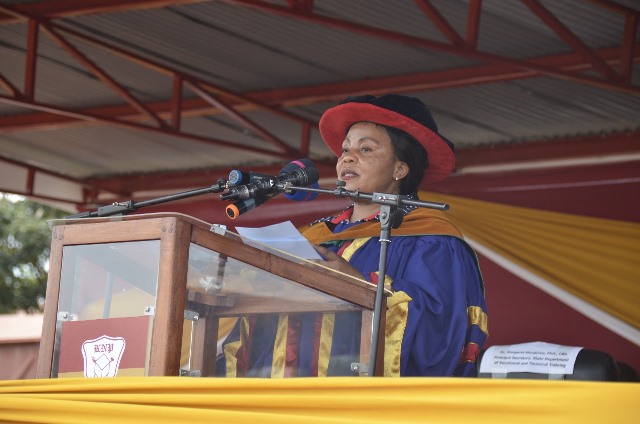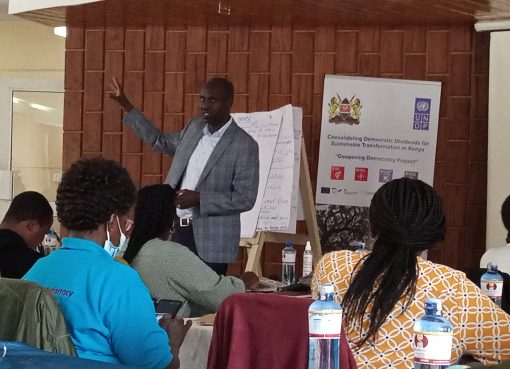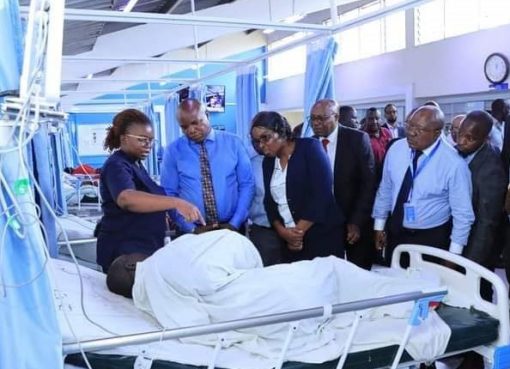The Government has urged the youth who miss joining public universities to enroll in vocational training colleges to bridge the gap for technical skills in the public and private sector.
Principal Secretary, State Department for Vocational and Technical Training, Dr Margaret Mwakima, made the call during the Kitale National Polytechnic graduation ceremony held at the institution.
Referring to a survey conducted by the Kenya Association of Manufacturers (KAM), PS Mwakima noted that there existed approximately 500,000 skills-oriented vacancies, both in the public and private sectors in the country.
Dr Mwakima emphasized the core objectives of Technical and Vocational Education and Training (TVET), saying by use of formal and non-formal and informal learning, the colleges equip learners with knowledge and technical skills for employment.
She said the Country’s economic growth and development was anchored on TVET, adding the government has been establishing TVET institutions to expand opportunities for the youth and promote acquisition of technical skills.
“TVETs the world over, are recognized as crucial vehicles for social equity, inclusion and sustainable development,” observed Mwakima.
According to the PS, the current data of student enrolment in TVET colleges across the country is 249,316.
“This is the reason we urge parents, guardians and sponsors to encourage their children to go for courses at our Technical and Vocational Education and Training institutions, in order to adequately address the 500,000 technical skills gap identified by the manufacturers association,” she appealed.
Mwakima reiterated the government’s commitment towards ensuring all learners in primary and secondary schools progressed with education, immediately after sitting for their national examinations.
“This has seen the government expand TVET training by increasing the number of TVET institutions, spread across the country, which stand at 238 at a cost of Sh10.6 billion,” Mwakima said.
She implored parents in Trans Nzoia County to embrace TVET training to buttress the government’s efforts to make Kenya a manufacturing hub as well as empower the youth to participate in gainful employment to spur nation building.
To improve quality of training and production of industry relevant competencies for both the local and international labour market, the PS disclosed that the department had instituted reforms through TVET blueprint, which is a five-year strategy geared towards informing the TVET Agenda and the Youth Agenda.
“The government, through the youth agenda, is committed towards empowering the youth to take up courses that match industry demands in order to achieve the ‘Big Four Agenda,’ the Sustainable Development Goals, and the Vision 2030,” she explained.
Mwakima underscored an on-going curriculum reforms within the sector from supply-based to demand-based Competency Based Education and Training (CBET).
“This is a flexible model developed in liaison with industry to guarantee its relevance to economic growth. This will see TVET graduates acquire industry relevant skills, to meet the labour gaps in the industry,” underscored Mwakima.
The Government has standardized the cost of TVET training across board at Sh56, 420 per annum, with each trainee receiving capitation grants of Sh30, 000 per annum.
TVET trainees are also accessing loans from The Higher Education Loans Board (HELB), to further supplement the cost of training.
“Bursaries from Constituency Development Funds (CDF), as well as grants by County Governments, have made TVET education much affordable,” added Mwakima.
A total of 1,387 trainees at the Kitale National Polytechnic graduated with artisan, craft, diploma and high diploma certificates.
“I encourage the graduates to take advantage of the Youth Enterprise Development Fund to access startups’ capital and contribute in job creation as well as enhance socio-economic development,” she advised.
The event was attended by Education Chief Administrative Secretary (CAS), Mr Noor Hassan Noor, Trans Nzoia Deputy Governor, Dr Stanley Tarus and Kiminini Legislator, Mr Chris Wamalwa.
By Maurice Aluda




